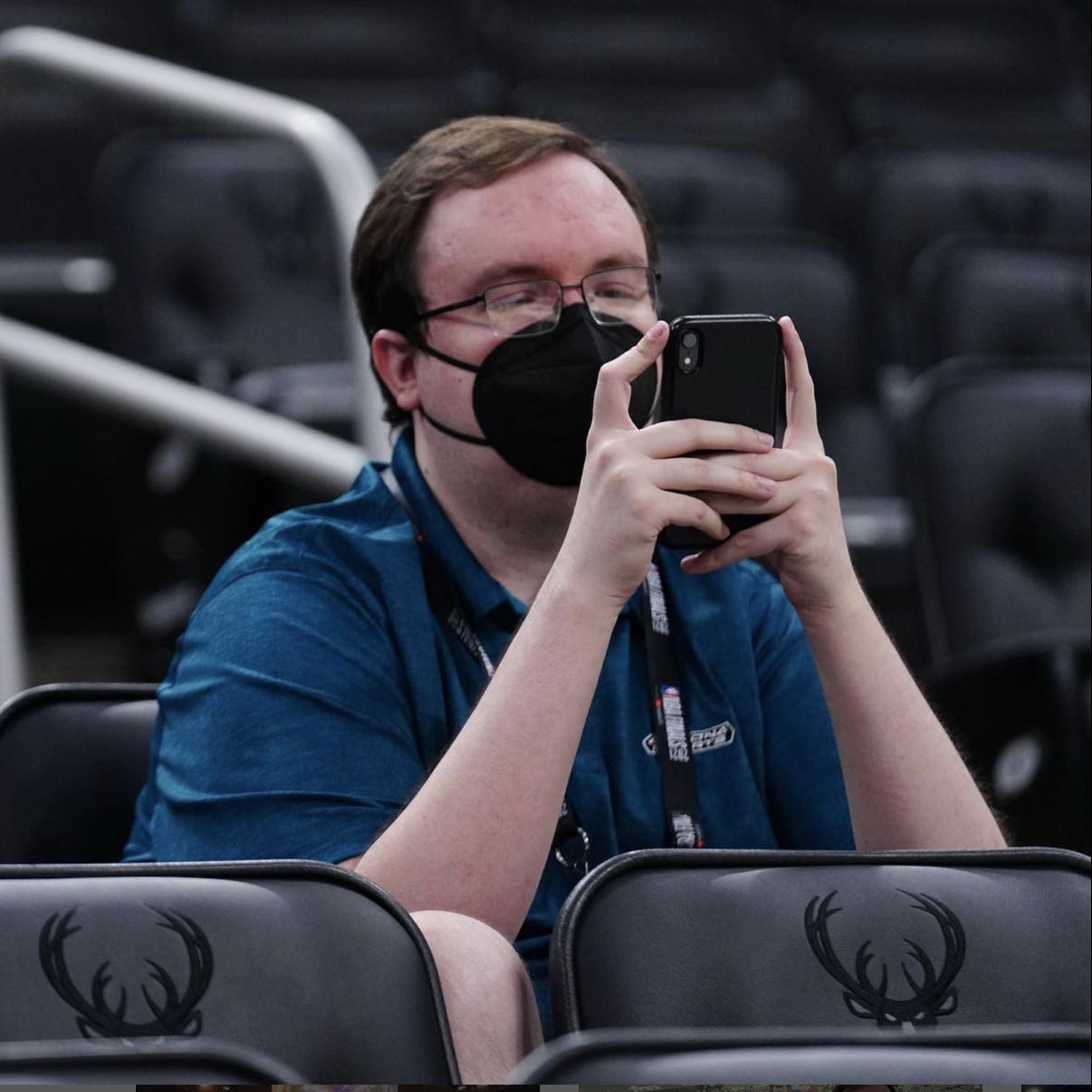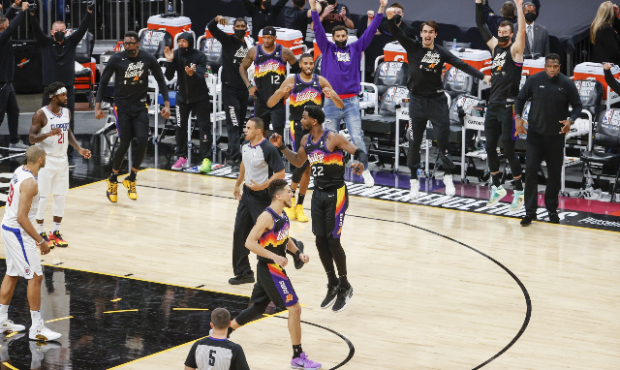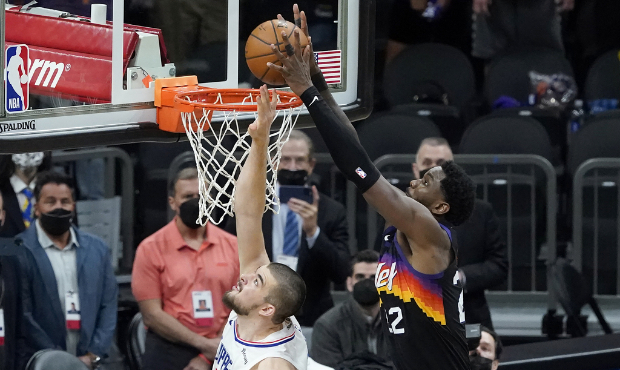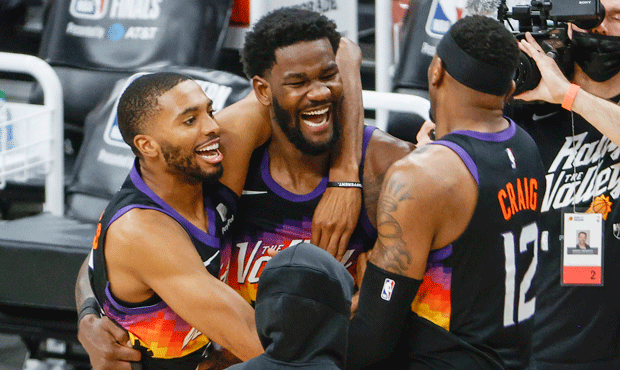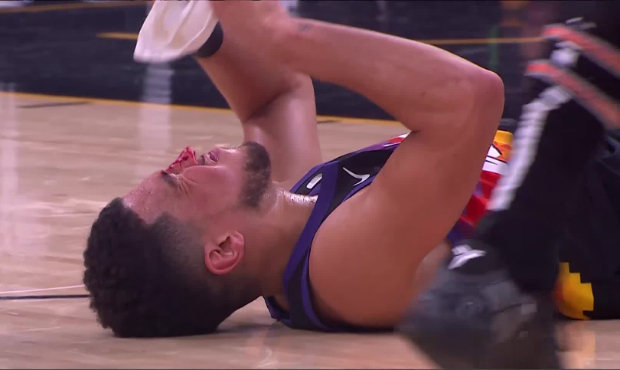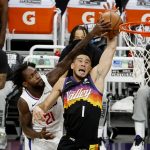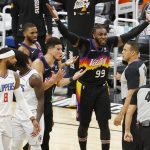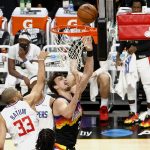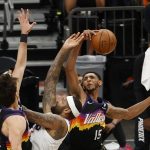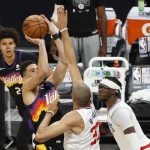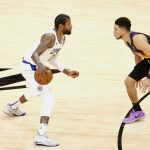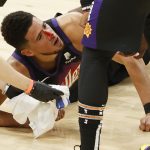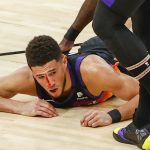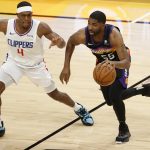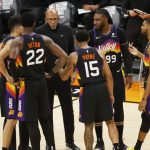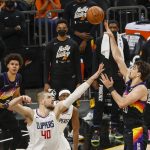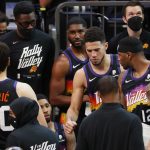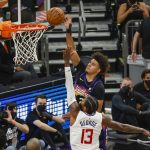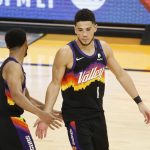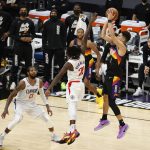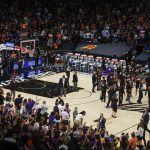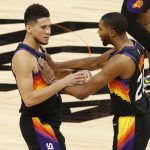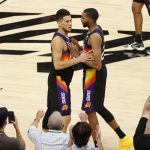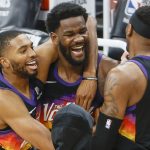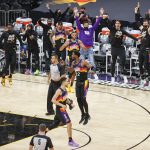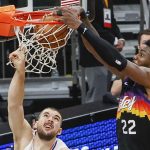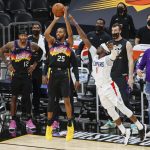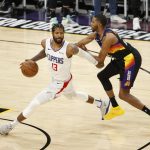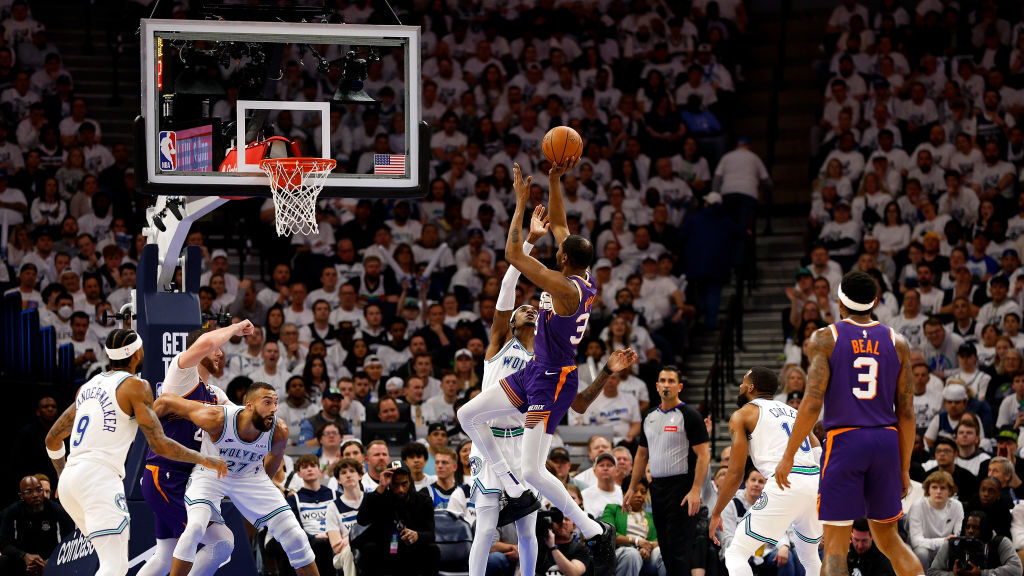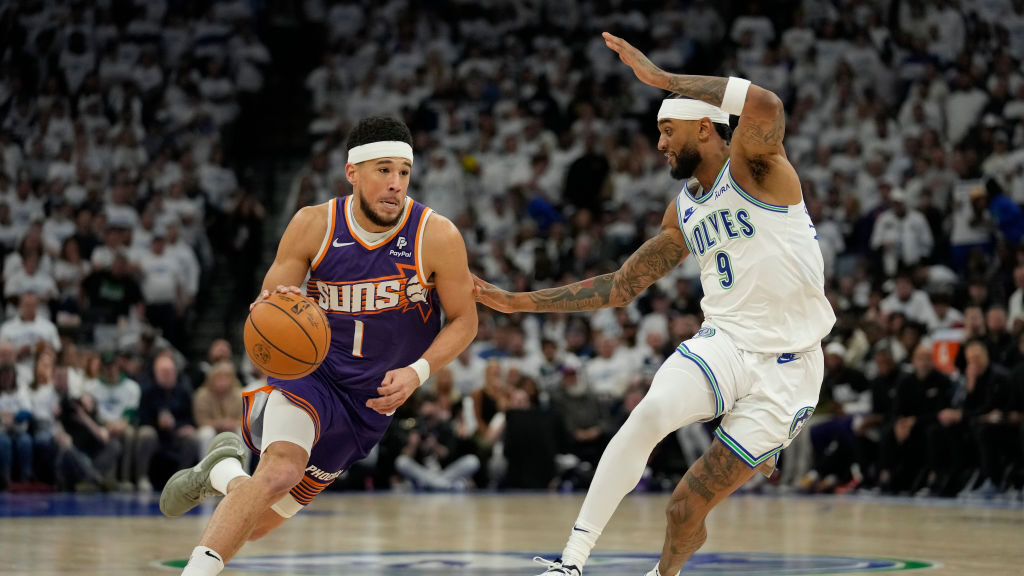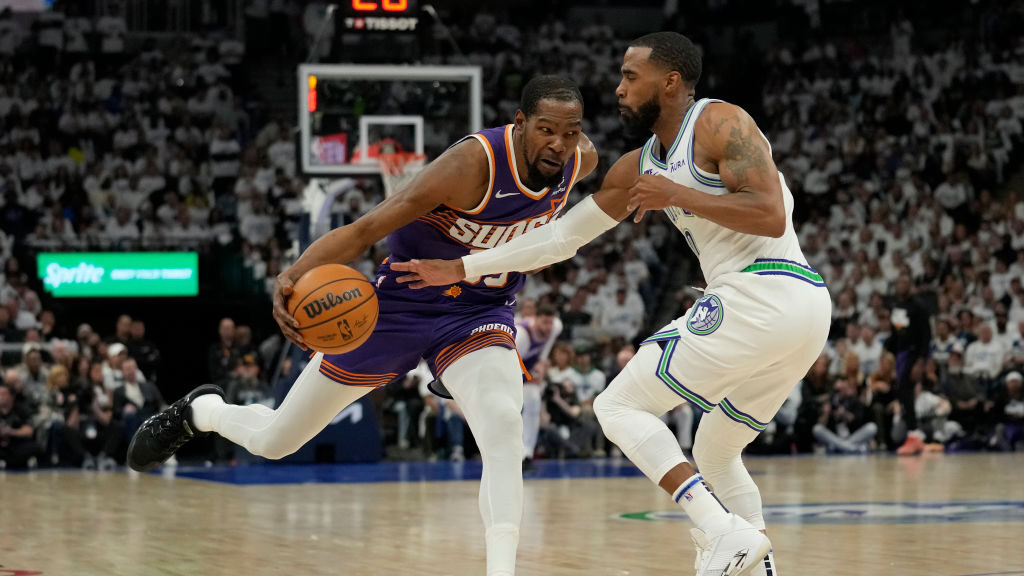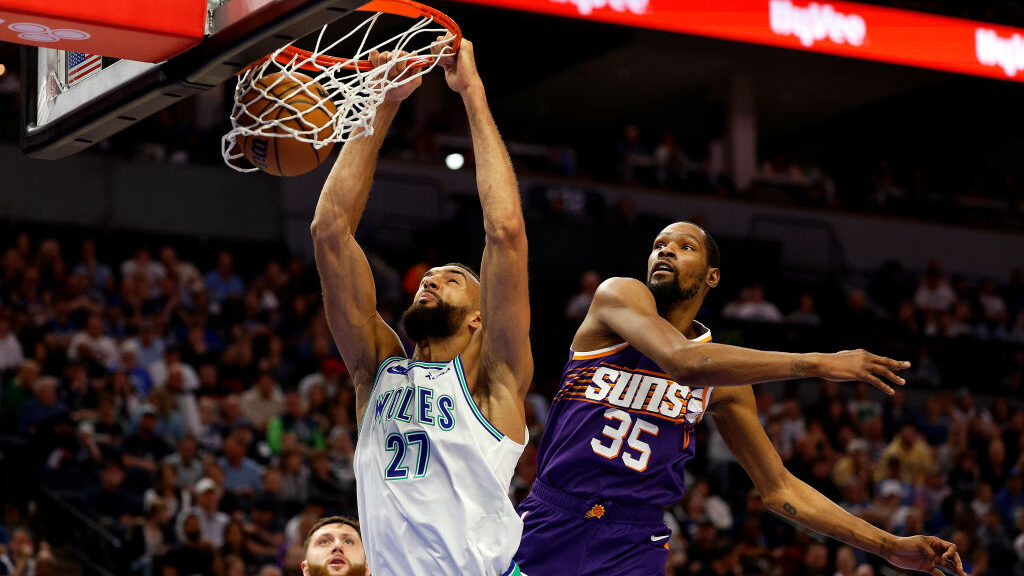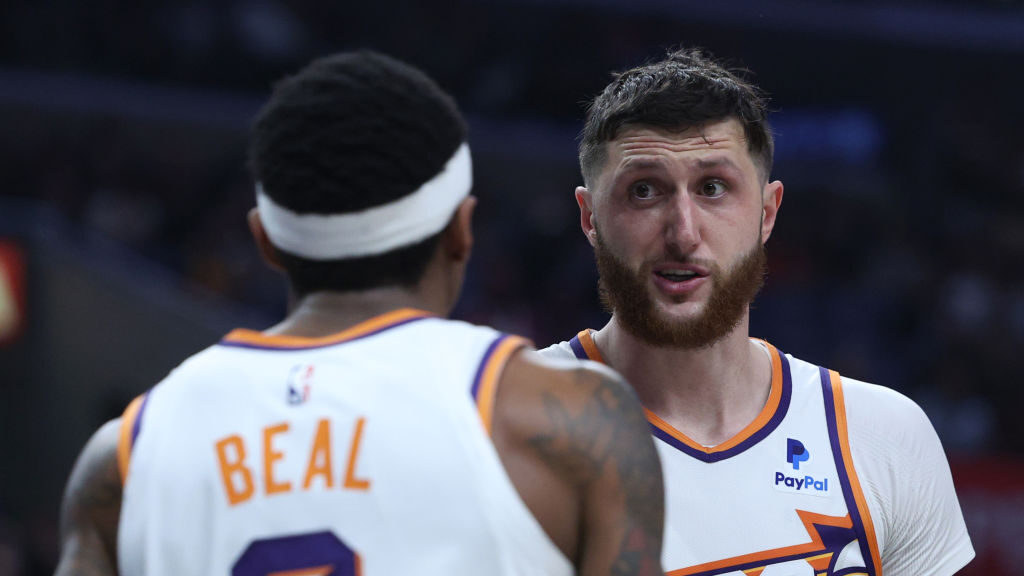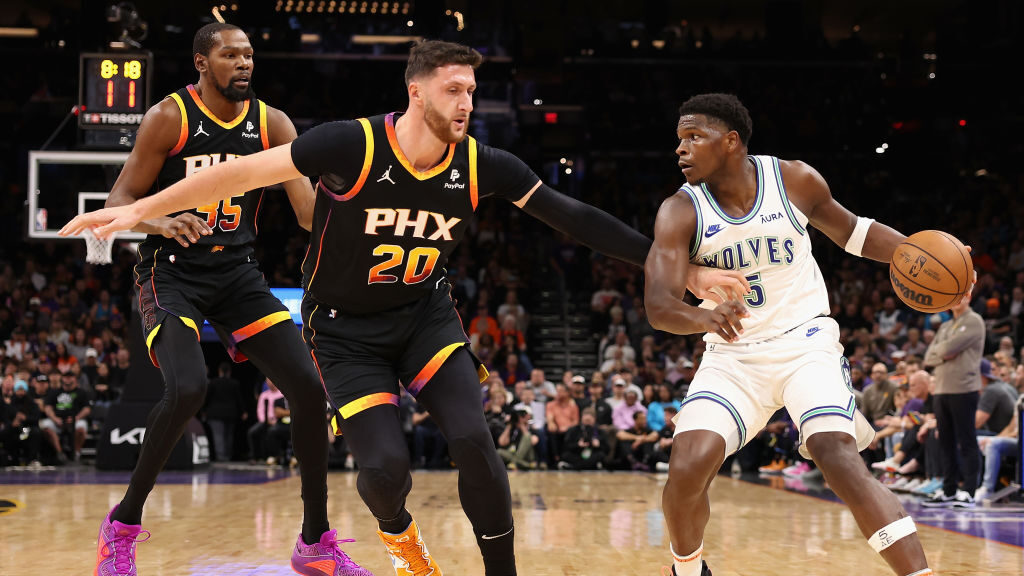‘Seen that movie before’: Suns’ miracle lob steals Game 2 from Clippers
Jun 23, 2021, 12:20 AM | Updated: 8:01 am
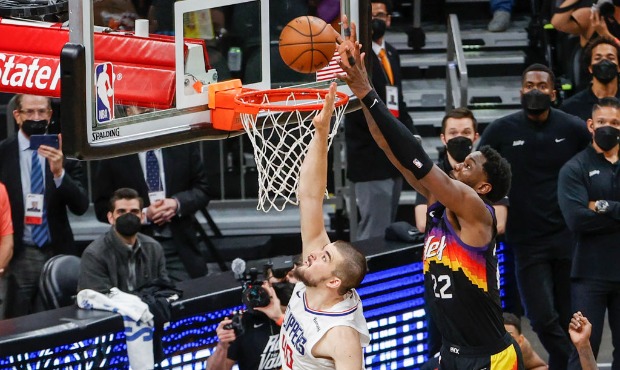
Deandre Ayton #22 of the Phoenix Suns dunks the ball over Ivica Zubac #40 of the LA Clippers during the fourth quarter in game two of the NBA Western Conference finals in-which the Phoenix Suns defeated the LA Clippers 104-103 at Phoenix Suns Arena on June 22, 2021 in Phoenix, Arizona. (Photo by Christian Petersen/Getty Images)
(Photo by Christian Petersen/Getty Images)
PHOENIX — Consider it a badge of honor in your Phoenix Suns fandom if you knew that Deandre Ayton’s game-winning dunk with 0.7 seconds left Tuesday night against the Los Angeles Clippers was a good basket immediately afterward.
If you knew, you did because the Suns executed a similar play in December of 2017. Tyson Chandler (!) caught a lob on an inbounds pass from Dragan Bender (!!!) with 0.6 seconds left to give Phoenix their 13th win out of 21 on the season over the Memphis Grizzlies.
Suns have seen another game-winning oop before 😨 pic.twitter.com/JswGSvfjsj
— Bleacher Report (@BleacherReport) June 23, 2021
Yes, Mr. Bender is working his way into the second sentence of a story about Game 2 of the Western Conference Finals for the Suns, a 104-103 heist by Phoenix to take a 2-0 series lead. That’s because Bender’s inbounds pass was not a legal shot attempt, therefore, Chandler at the rim could commit acts that would normally be deemed as basket interference.
That crack in the rulebook that then-Suns head coach Jay Triano discovered at a referee seminar over 15 years prior to the play is the same one the Suns slipped through Tuesday for a far, far more important victory.
Fittingly, the only member of that 2017-18 team remaining on this year’s roster is, of course, Devin Booker. So, unlike Ayton, he knew right away.
“Even talking to (Rajon) Rondo at halfcourt after the game, he was like, ‘It don’t count,'” Booker said.
“I’ve done seen this movie before. It counts, it counts.”
In 2017, before Chandler’s successful alley-oop inbounds play, Booker experienced Triano walking through the set in practice while explaining the rule and thought the coach was crazy.
Back in the present, Ayton was anxious and shaky after his dunk because he wasn’t sure if he had committed a “blooper.” Suns head coach Monty Williams talked Ayton through a rule he didn’t know existed.
“No, heck no. That’s why I didn’t want to react,” Ayton said of the rule. “Man, it’s so hard to explain … I’m worried, but I did what coach told me to do. So I’m like, ‘Is it on me?’ And coach looked at me said, ‘Yo, that’s the rule. If it’s above the cylinder, you can finish that play.’ I wasn’t too sure if he was right.”
Williams was right, and it won the Suns a game that can swing the series before the NBA Finals, and it’s hard not to feel that way after everything that wasn’t going well for them.
Phoenix shot 6-of-26 (23.1%) from three-point range.
Booker had 20 points on 5-of-16 shooting with five assists and eight turnovers after the best game of his life. He had to get stitches in the third quarter after being busted open on a collision with the Clippers’ Patrick Beverley and clearly wasn’t himself in the closing frame when he returned.
The Suns got seven points combined from Mikal Bridges (5) and Jae Crowder (2).
And while it wasn’t the type of game they shy away from in the slightest, the physical, rugged battle featured a tight whistle and agonizingly slow pace that the Clippers must have loved.
If there was a game for the Clippers to take in The Valley, they won’t get a better opportunity than they did on Tuesday, especially without Kawhi Leonard (knee) again.
But heroic efforts from Cam Payne and Ayton stifled that.
Payne, starting in place of the missing Chris Paul (COVID-19 protocols) for the second straight game, followed up Booker’s best ever night in Game 1 with his own in Game 2. He had a career-high 29 points, nine assists, two steals, two blocks and zero turnovers.
You probably have a pretty good idea about who is particularly thrilled about that last stat. Well, Payne is just as hyped as Paul likely is.
“Honestly, it’s just holding it down for C … My only thing was no turnovers,” Payne said. “I’m trying to keep that same identity because I’m the point guard.”
Ayton contributed 24 points and 14 rebounds on 12-for-15 shooting. With the Clippers making some adjustments, Ayton found different pockets of space in Game 2, getting four different midrange looks to fall.
Those two were a consistent source of offense in a game Los Angeles did the best it could to turn into a rock-throwing fight.
The duo combined for 19, nine, 15 and 10 points through the first to the final period, respectively.
As consistent as they were, so too were the Clippers. There was no terrific Paul George outing like Game 1 or a barrage of three-pointers. Instead, it was timely shots.
The Suns’ biggest lead was nine points, and it should have expanded in the second half if not for Los Angeles’ incredible ability to produce answer after answer to Suns points.
At the 5:04 mark of the third quarter, Ayton made a shot that put the Suns up by eight points before the Clippers’ Reggie Jackson drilled a trey ball 18 seconds later.
There would be six more times from that point on where a Suns basket put the team up 6-9 points, only for the Clippers to answer with a three-pointer.
The seventh was George’s with 2:41 left that made it 96-93 Suns.
Ayton would then score off an assist from Payne, Los Angeles’ Ivica Zubac got a bucket and then a Payne 3-footer on a drive had it at a five-point Suns edge. Again, however, there was a counter shot from the Clippers, this time via Luke Kennard to have it 100-97 Suns with 1:23 remaining.
That’s when a game full of stoppages and reviews got ridiculous. The last 90 seconds of the game would take 33 real-time minutes, and the first sequence to lend itself to that was Booker’s seventh turnover in the game.
Booker was penetrating and kicking the ball out to an open shooter when Beverley bowled over in front of him. The referees blew the whistle, only to not make a call on the floor. There was no ruling of a foul being determined, offensive or defensive.
Instead, it was to a review for a hostile act by Booker to see if he had hit Beverley up high.
He had not, but head official Scott Foster said after that type of specific review they are able to determine a foul call after the fact, and it was ruled an offensive foul on Booker.
Unlike most watching, Booker had seen that alley-oop finish on an inbound pass before.
But for something like this? No. This was not the case.
“I’ve never seen that before,” Booker said. “I tried to get an explanation. I don’t know. I was more disappointed because we had a wide-open shot in the corner (after the vague whistle).”
Ten seconds later, Booker fouled George for his fifth personal and George made both his free throws to put the Clippers within one.
Following that, Payne had a finish at the rim blocked by Zubac and George grabbed the rebound, quickly pushed it down the floor and got a layup out of it.
Just like that, the Clippers had a 101-100 lead with 31 seconds left.
On the inbounds play, Booker got to his spot immediately at the right elbow and converted on a 15-foot pull-up, taking only four seconds off the clock.
And five seconds after that, George hit his own jumper, this one from 22 out to give the Clippers the lead back.
Williams, with only one timeout left, let Booker bring it up and make a play. But Booker had the ball stripped by Beverley, and in a play originally called as out of bounds and Suns ball, it was reversed after a review as Clippers ball and would be Booker’s eighth and final turnover.
Los Angeles, up one with nine seconds, got the ball to George for the free throws. And as you can see, he had been the man to this point, scoring the Clippers’ last six points on big play after big play.
But he missed both free throws, and after Williams used that final timeout, he created a great look that got Booker doubled rapidly and it resulted in an open corner 3 for Bridges.
The wing missed, and the ball went out of bounds off the Clippers to the spot on the baseline where Crowder would later throw one of the most important passes in Suns franchise history to Ayton.
After an eternity of a review to confirm Ayton’s basket and clear up some mixups on substitutions, the Clippers’ pass downcourt connected with George, but he didn’t get a shot off in time and that was that.

